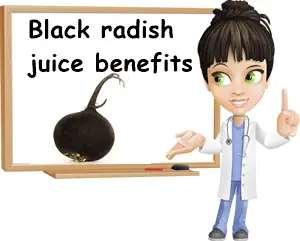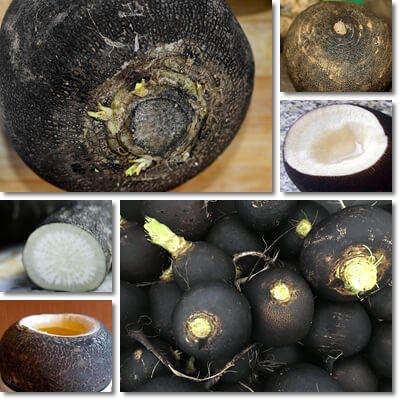Black radish juice is the juice extracted from black radishes, a variety of winter radish with dark brown-black or black skin. Black radish juice is a tonic vegetable juice and nutraceutical with various benefits for health. Drinking black radish juice is good for high blood pressure and dehydration, promotes liver health and boasts antioxidant, anti-inflammatory and anticancer properties. Modestly nutritious, black radish juice provides B vitamins, vitamin C, if unpasteurized, and a range of dietary minerals and bioactive components such as glucosinolates.
How to Make black radish juice (3 ways)
You can use a juicing machine to make black radish juice, feeding chunks of typically peeled black radish to the juicer. You can also grind black radishes using a plain food processor, then strain the resulting mush through a fine cloth to get the juice. Don’t discard the remaining root material; you can use it to make vegetable cream soups, savory breads, pancakes, muffins or even spreads. And the absolute simplest way to get black radish juice is to clean your radishes well, tap dry with a paper towel, then scoop a hole at the top and just allow it to fill up with juice. Drink the juice as it fills. As for the peels, dry and grind them finely and use as dietary supplements.

What does black radish juice look like?
100% pure black radish juice is a clear liquid, similar in appearance to water. Black radish juice with added pulp material can be whitish in color. Any other colors suggest additional ingredients, whether food colorants or other fruit or vegetable juices. To make it look more appealing and increase its therapeutic properties, you can mix black radish juice with red or yellow beetroot juice, red, yellow, orange or black carrot juice etc. and sweeten with raw honey.
What does black radish juice taste like?
The taste of black radish juice may differ according to how the juice is produced, the age of the radish at harvest time and other factors. 100% real, unsweetened black radish juice should have an overall mild taste, faintly sweet, with pleasant bitter notes and earthy, woody flavors. If your black radish juice is overtly sweet, then it has likely been sweetened. If you are making it at home but would like to improve its taste, you can always add one or more of your favorite raw honey varieties to it to make it even healthier and increase its therapeutic potential.
Black radish juice nutrition facts
Black radish juice contains vitamins B1, B2, B3, B5, B6, B9 as well as vitamin C, and the minerals calcium, copper, iron, magnesium, manganese, phosphorus, potassium and zinc, as well as various antioxidants and phytochemicals, including glucosinolates. The essential vitamins and minerals are water-soluble and leak into the juice from the pulp, lending it restorative properties. Overall, black radish juice is modestly nutritious, but nonetheless a source of important bioactive components.

What is black radish juice good for?
Antioxidant properties
Antioxidants in black radish juice scavenge free radicals and help combat, limit and repair cell damage associated with oxidative stress. In an animal study, squeezed juice from black radish root was shown to reduce several products of the damage produced by oxidative stress, such as TBARS, and improve antioxidant enzyme activities and the free radical scavenging capacity (source).
Remedy for sore throat and cough
Black radish juice sweetened with raw honey is an effective home remedy for cough and sore throat. Drinking black radish juice with honey soothes throat irritation and reduces inflammation, calms cough and supports a faster recovery in respiratory tract infections by exerting local antibacterial effects. The good content of vitamin C in black radish juice further provides anti-inflammatory benefits, reducing throat soreness.
Good for respiratory tract infections
Black radish juice sweetened with raw honey is an effective natural remedy for respiratory tract infections. Isothiocyanates, metabolites of glucosinolates from black radish, have scientifically proven antibacterial properties, actively inhibiting bacteria growth. Raw honey also exerts local antibacterial effects via an acidic pH, a low moisture content and unique antimicrobial agents that actively reduce bacterial load and suppress infection (e.g. hydrogen peroxide in flower honeys, glucose oxidase in forest honeys such as Greek pine honey, methylglyoxal in manuka honey).
Antibacterial benefits
Studies show isothiocyanates, metabolites of glucosinolates in black radish, horseradish, broccoli and related cabbage family vegetables, appear to be effective against the most important human pathogens, including bacteria with resistant phenotypes (source). The raw, unpasteurized juice is also a good source of vitamin C with proven antibacterial, antiviral and immune system boosting effects.
Note: However this does not mean that black radish juice constitutes treatment for bacterial infections; it is merely an adjuvant with supportive antibacterial benefits.
Anti-inflammatory properties
Raw, unpasteurized black radish juice is a good source of vitamin C, a water-soluble anti-inflammatory vitamin. Studies show a high blood plasma concentration of vitamin C lowers levels of inflammation markers in the body such as C-reactive protein. Black radish and black radish juice are also a source of antioxidants and other bioactive components that stimulate the expression of detoxification enzymes, further contributing to reducing inflammation levels in the body.
Benefits for colon health
In a study, black radish was shown to combat inflammation and associated microscopic anatomical changes to the colon lining of rats fed a high fat diet (source). Eating the pulp and even skin in addition to drinking the juice can further promote colon health.
Helps prevent cholesterol gallstones
Biologically active isothiocyanates derived from glucosinolates in black radish and black radish juice have been shown to lower blood cholesterol and hepatic cholesterol levels which can help prevent the formation of cholesterol gallstones (source), contributing to gallbladder and digestive health.
Benefits for liver health
Studies show glucosinolates and their metabolites, isothiocyanates, occurring naturally in black radish and black radish juice exert hepatoprotective properties via multiple therapeutic pathways (source).
The bioactive compounds increase the activity of detoxification enzymes, combat and limit cholesterol oxidation, lower hepatic cholesterol levels and exert anti-inflammatory and antioxidant effects.
Anticancer properties
Bioactive glucosinolates in black radish, black radish juice and other cabbage family vegetables, and their metabolites, isothiocyanates, have scientifically proven anticancer properties. According to research, the capacity of organic isothiocyanates to block chemical carcinogenesis was first recognized more than 30 years ago. Anticancer protection is conferred to a variety of target organs including the lungs, liver, forestomach, mammary gland, esophagus, small intestine, colon and bladder (source).
- Inhibit the activity of a number of enzymes known to activate carcinogens, cancer-causing agents.
- Activate phase 2 detoxification enzymes, accelerating detoxification/disposal of carcinogens.
- Antioxidant action, scavenge for free radicals and support detoxification processes.
- Induce apoptosis, or programmed cell death.
- Inhibit angiogenesis, the process of formation of new blood vessels that support tumor growth.
- Antitumor effects, shown to inhibit the growth of several types of cultured cancer cells, including leukemia, prostate cancer, breast cancer, lung cancer, cervical cancer, and colon cancer.
- Shown to inhibit the in vitro growth and induce apoptosis in human leukemia HL-60 (p53+) and myeloblastic leukemia-1 cells, non-small cell lung carcinoma A549 cells.
While more research is needed, particularly human studies, there is enough preliminary evidence to suggest isothiocyanates, metabolites of glucosinolates found in all cabbage family vegetables, including pink, purple and black radishes and their juice, have excellent chemopreventive potential.
Benefits for blood pressure
Drinking black radish juice provides minor anti-hypertensive benefits, lowering blood pressure numbers. The blood pressure lowering properties are owed to a modest potassium and magnesium content.
Tonic food
Black radish juice acts as a restorative agent, providing electrolytes with circulatory benefits (e.g. calcium, magnesium, potassium, sodium) and B vitamins to energize the body. The juice further helps maintain adequate levels of hydration and contributes to blood volume, exerting a revitalizing effect.
Good source of vitamin C
One of the biggest benefits of drinking black radish juice is it provides a good content of vitamin C, an essential water-soluble vitamin with proven antioxidant, anti-inflammatory, antibacterial, antiviral and immune system boosting properties. To get vitamin C from black radish juice, the juice must be raw (not pasteurized) or, in the case of home-made black radish juice, freshly made and consumed immediately. Exposure to air, light and heat degrades vitamin C.
What are the side effects of Black Radish Juice?
Black radish juice is generally safe to use as a tonic nutraceutical and food, but must be consumed reasonably. The same bioactive ingredients that are responsible for some of the biggest health benefits of black radish juice, glucosinolates that yield isothiocyanates, are also a potential source of side effects, if intake is excessive. In nature, glucosinolates act as pesticides, deterring insects and animals from eating the plant.
Drinking too much black radish juice for prolonged periods of time can cause side effects such as mild toxicity and goitrogenic effects by interfering with the normal production of thyroid hormones, increasing risks of developing a goiter due to enlargement of the thyroid gland. Black radish juice can also potentially interact with thyroid medication, amplifying or diminishing their therapeutic activity.
